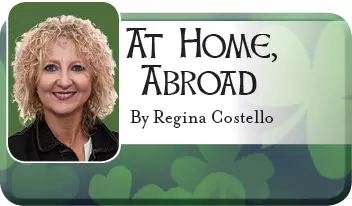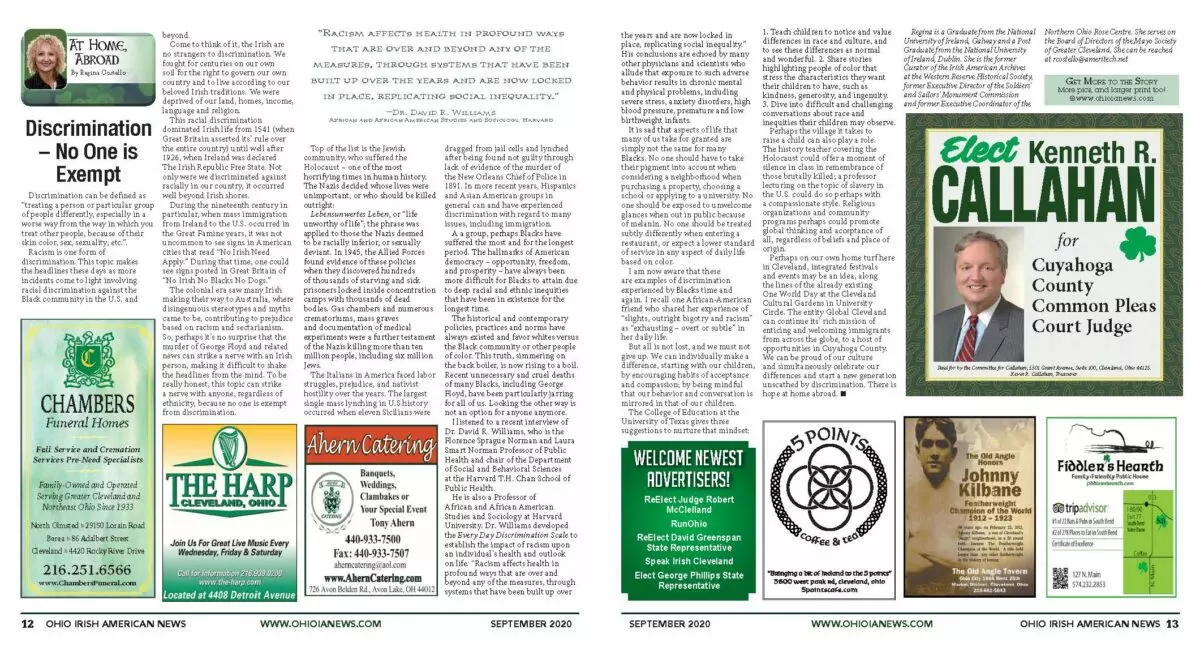At Home Abroad: Discrimination – No One is Exempt
- John O'Brien
- September 7, 2020
- Edited 6 months ago
Table of Contents

At Home Abroad: Discrimination – No One is Exempt
By Regina Costello
Discrimination can be defined as “treating a person or particular group of people differently,
especially in a worse way from the way in which you treat other people, because of their skin color, sex, sexuality, etc.”.
Racism is one form of discrimination. This topic makes the headlines these days as more incidents come to light involving racial discrimination against the Black community in the U.S. and beyond.
Come to think of it, the Irish are no strangers to discrimination. We fought for centuries on our own soil for the right to govern our own country and to live according to our beloved Irish traditions. We were deprived of our land, homes, income, language and religion.
Discrimination
This racial discrimination dominated Irish life from 1541 (when Great Britain asserted its’ rule over the entire country) until well after 1926, when Ireland was declared The Irish Republic Free State. Not only were we discriminated against racially in our country, it occurred well beyond Irish shores.
During the nineteenth century in particular, when mass immigration from Ireland to the U.S. occurred in the Great Famine years, it was not uncommon to see signs in American cities that read “No Irish Need Apply.” During that time, one could see signs posted in Great Britain of “No Irish No Blacks No Dogs.”
The colonial era saw many Irish making their way to Australia, where disingenuous stereotypes and myths came to be, contributing to prejudice based on racism and sectarianism. So, perhaps it’s no surprise that the murder of George Floyd and related news can strike a nerve with an Irish person, making it difficult to shake the headlines from the mind. To be really honest, this topic can strike a nerve with anyone, regardless of ethnicity, because no one is exempt from discrimination.
Top of the list is the Jewish community, who suffered the Holocaust – one of the most horrifying times in human history. The Nazis decided whose lives were unimportant, or who should be killed outright:
Lebensunwertes Leben, or “life unworthy of life”; the phrase was applied to those the Nazis deemed to be racially inferior, or sexually deviant. In 1945, the Allied Forces found evidence of these policies when they discovered hundreds of thousands of starving and sick prisoners locked inside concentration camps with thousands of dead bodies. Gas chambers and numerous crematoriums, mass graves and documentation of medical experiments were a further testament of the Nazis killing more than ten million people, including six million Jews.
The Italians in America faced labor struggles, prejudice, and nativist hostility over the years. The largest single mass lynching in U.S history occurred when eleven Sicilians were dragged from jail cells and lynched after being found not guilty through lack of evidence of the murder of the New Orleans Chief of Police in 1891. In more recent years, Hispanics and Asian American groups in general can and have experienced discrimination with regard to many issues, including immigration.
A a group, perhaps Blacks have suffered the most and for the longest period. The hallmarks of American democracy – opportunity, freedom, and prosperity – have always been more difficult for Blacks to attain due to deep racial and ethnic inequities that have been in existence for the longest time.
George Floyd
The historical and contemporary policies, practices and norms have always existed and favor whites versus the Black community or other people of color. This truth, simmering on the back boiler, is now rising to a boil. Recent unnecessary and cruel deaths of many Blacks, including George Floyd, have been particularly jarring for all of us. Looking the other way is not an option for anyone anymore.
I listened to a recent interview of Dr. David R. Williams, who is the Florence Sprague Norman and Laura Smart Norman Professor of Public Health and chair of the Department of Social and Behavioral Sciences at the Harvard T.H. Chan School of Public Health.
He is also a Professor of African and African American Studies and Sociology at Harvard University. Dr. Williamsdeveloped the Every Day Discrimination Scale to establish the impact of racism upon an individual’s health and outlook on life. “Racism affects health in profound ways that are over and beyond any of the measures, through systems that have been built up over the years and are now locked in place, replicating social inequality.” His conclusions are echoed by many other physicians and scientists who allude that exposure to such adverse behavior results in chronic mental and physical problems, including severe stress, anxiety disorders, high blood pressure, premature and low birthweight infants.
It is sad that aspects of life that many of us take for granted are simply not the same for many Blacks. No one should have to take their pigment into account when considering a neighborhood when purchasing a property, choosing a school or applying to a university. No one should be exposed to unwelcome glances when out in public because of melanin. No one should be treated subtly differently when entering a restaurant, or expect a lower standard of service in any aspect of daily life based on color.
I am now aware that these are examples of discrimination experienced by Blacks time and again. I recall one African-American friend who shared her experience of “slights, outright bigotry and racism” as “exhausting – overt or subtle” in her daily life.
But all is not lost, and we must not give up. We can individually make a difference, starting with our children, by encouraging habits of acceptance and compassion; by being mindful that our behavior and conversation is mirrored in that of our children.
The College of Education at the University of Texas gives three suggestions to nurture that mindset: 1. Teach children to notice and value differences in race and culture, and to see these differences as normal and wonderful. 2. Share stories highlighting people of color that stress the characteristics they want their children to have, such as kindness, generosity, and ingenuity. 3. Dive into difficult and challenging conversations about race and inequities their children may observe.
Perhaps the village it takes to raise a child can also play a role. The history teacher covering the Holocaust could offer a moment of silence in class in remembrance of those brutally killed; a professor lecturing on the topic of slavery in the U.S. could do so perhaps with a compassionate style. Religious organizations and community programs perhaps could promote global thinking and acceptance of all, regardless of beliefs and place of origin.
Perhaps on our own home turf here in Cleveland, integrated festivals and events may be an idea, along the lines of the already existing One World Day at the Cleveland Cultural Gardens in University Circle. The entity Global Cleveland can continue its’ rich mission of enticing and welcoming immigrants from across the globe, to a host of opportunities in Cuyahoga County. We can be proud of our culture and simultaneously celebrate our differences and start a new generation unscathed by discrimination. There is hope at home abroad.
Sources consulted:
https://dictionary.cambridge.org; https://youthforhumanrights.org; https://www.jstor.org;
https://scholar.harvard.edu; https://www.apa.org/members/content/williams-health-disparities; https://www.apa.org/members/content/williams-health-disparities; https://theguardian.com; https://www.loc.gov/teachers/classroommaterials/presentationsandactivities/presentations/ immigration/ italian8.html; https://theyorkhistorian.com; https://hsph.harvard.edu
https://www.theatlantic.com/photo/2011/10/world-war-ii-the-holocaust/100170/ https://www.cnn.com/videos/tv/2020/06/07/exp-gps-0607-williams-on-black-americans-and-covid.cnn; https://www.cnn.com/videos/tv/2020/06/07/exp-gps-0607-williams-on-black-americans-and-covid.cnn; https://www.urban.org/features/structural-racism-america A New History of the Irish in Australia review: The importance of their presence. By Simon Caterson. January 11, 2019; Journal of Personality and Social Psychology © 2009 American Psychological Association 2009, Vol. 96, No. 6, 1259 –1271 0022-3514/09/$12.00 DOI: 10.1037/a0015335: Racial Discrimination and the Stress Process Anthony D. Ong and Thomas Fuller-Rowell Cornell University Anthony L. Burrow Loyola University Chicago.
*Regina is a Graduate from the National University of Ireland, Galway and a Post Graduate from the National University of Ireland, Dublin. She is the former Curator of the Irish American Archives at the Western Reserve Historical Society, former Executive Director of the Soldiers’ and Sailors’ Monument Commission and former Executive Coordinator of the Northern Ohio Rose Centre. She serves on the Board of Directors of the Mayo Society of Greater Cleveland. She can be reached at [email protected]





